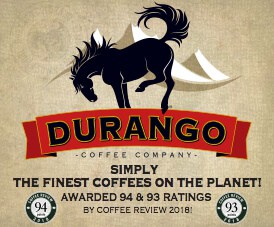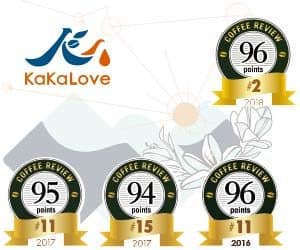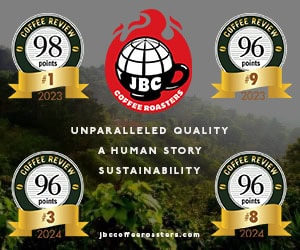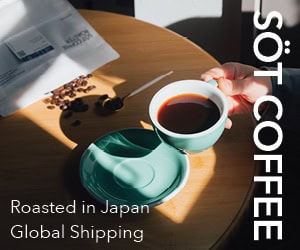Produced at Black Rock Farm, overlooking Kona’s Kealakekua Bay, entirely of the Typica variety of Arabica and processed by the wet, or washed, method. Paradise Roasters specializes in micro-lot Arabica and Robusta coffees from Asia and other emerging origins. The company prides itself on quality and freshness, craft-roasting coffees in small batches only after orders are placed. Visit
SEARCH RESULTS
Sumatra Pantan Musara
Produced by smallholding farmers of the Gayo 1, Gayo 2, P88, Abyssinia, and Ateng Super varieties of Arabica and processed by the wet, or washed, method. Paradise Roasters specializes in micro-lot Arabica and Robusta coffees from Asia and other emerging origins. The company prides itself on quality and freshness, craft-roasting coffees in small batches only after orders are placed. Visit
Organic Ethiopia Agaro-Nano Challa
Certified organic. Ethiopia coffees like this one are produced largely from local, indigenous varieties of Arabica. Produced by smallholding members of the Nano Challa Cooperative and processed by the wet, or washed, method (fruit skin and pulp are removed before drying). Paradise Roasters specializes in micro-lot Arabica and Robusta coffees from Asia and other emerging origins. The company prides
Coffea Diversa Liberica Carbonic Maceration
Produced by Gonzalo Hernandez at his Coffea Diversa “coffee garden” in Costa Rica entirely of the Deweverei variety of coffea Liberica. Liberica is a species of coffee native to central Africa and long cultivated in parts of Southeast Asia. Processed by the carbonic maceration natural method, which involves fermenting whole fruit inside a sealed container that has been flushed with CO2. Paradise
Colombia Finca Lord Baltimore Papayo
Produced by Deiro Garcia in Colombia at Finca Lord Baltimore entirely of the Ethiopia landrace Papayo variety, and fermented in the whole fruit inside a hermetically sealed vessel, making it one version of what the coffee industry has come to call “anaerobic” or limited-oxygen processing. Paradise Roasters specializes in micro-lot Arabica and Robusta coffees from Asia and other emerging origins.
Hawai’i Ka’u Typica Anaerobic Washed
Ka’u is a now well-established Hawai’i coffee-growing district centered approximately thirty miles southeast of the famous Kona region. This coffee comes from trees of the traditional Typica variety and was wet-processed, with the fermentation step accomplished in a hermetically sealed vessel, making it a version of what the coffee industry has come to call “anaerobic” or limited-oxygen
Ecuador Finca Carolina Sidra
This coffee tied for the third-highest rating in a cupping of “desert-island coffees” submitted by roasters for Coffee Review’s May 2020 tasting report. Produced by Fausto Romo at Finca Carolina entirely of the Sidra variety of Arabica and processed by the wet, or washed, process. Paradise Roasters specializes in micro-lot Arabica and Robusta coffees from Asia and other emerging origins. The
Yemen Al-Obbarat
Produced by Hussien Nasser, Mohammed Massaud and Khalid Abdullah of the Dwairi and Typica varieties of Arabica and dried in the whole fruit, as are all Yemen coffees. Exported by Al-Hamdani Mokha. Paradise Roasters specializes in micro-lot Arabica and Robusta coffees from Asia and other emerging origins. The company prides itself on quality and freshness, craft-roasting coffees in small batches
Ecuador Quilanga Typica Yeast Fermentation
Produced by Bruhwer Coffee entirely of the Typica variety of Arabica and processed by the washed method utilizing a white wine yeast strain in the fermentation step. Paradise Roasters specializes in micro-lot Arabica and Robusta coffees from Asia and other emerging origins. The company prides itself on quality and freshness, craft-roasting coffees in small batches only after orders are placed.
S.O. Espresso Brazil Fazenda Cachoeira Yellow Bourbon
Produced at Fazenda Cachoeira de Grama entirely of the Yellow Bourbon variety of Arabica and processed by the natural method. Paradise Roasters specializes in micro-lot Arabica and Robusta coffees from Asia and other emerging origins. The company prides itself on quality and freshness, craft-roasting coffees in small batches only after orders are placed. Visit www.paradiseroasters.com or call
Colombia Geisha
Produced by several growers in Huila, entirely of the rare Ethiopia-derived botanical variety Geisha (also spelled Gesha). Processed by the washed method (fruit skin and pulp are removed before drying). Paradise Roasters specializes in micro-lot Arabica and Robusta coffees from Asia and other emerging origins. The company prides itself on quality and freshness, craft-roasting coffees in small
Ka’u Yellow Caturra Champagne Natural
Produced entirely of the Yellow Caturra variety of Arabica, this coffee was processed in the whole fruit inoculated with a wine yeast strain and fermented in sealed bags (“anaerobic” ferment) before being dried using a combination of sun and mechanical methods. Paradise Roasters specializes in micro-lot Arabica and Robusta coffees from Asia and other emerging origins. The company prides itself on
Buy Coffee E-Gift Cards
One of the best ways you can support coffee companies and their employees during the COVID-19 crisis is to simply purchase their coffee. Better yet, you can purchase e-gift cards, which provides immediate cash support. If possible, buy gift cards in excess of your immediate needs. Perhaps get an early start on your holiday gift shopping with some special stocking stuffers. On behalf of the
Kona Double-Washed Black Rock Farm
Produced entirely of the Typica variety of Arabica and processed by a variation on the double-washed method involving fermentation, washing and a second soak in fresh water. Paradise Roasters specializes in micro-lot Arabica and Robusta coffees from Asia and other emerging origins. The company prides itself on quality and freshness, craft-roasting coffees in small batches only after orders are
Ethiopia Sidama Anaerobic
Processed by the anaerobic method, which in this case means that the pulped or skinned coffee was fermented in a sealed, oxygen-evacuated tank for 36 hours before drying. Paradise Roasters specializes in micro-lot Arabica and Robusta coffees from Asia and other emerging origins. The company prides itself on quality and freshness, craft-roasting coffees in small batches only after orders are
Ethiopia Yirgacheffe Espresso Mekuriya Gobena
Produced by Mekuriya Gobena in the Yirgacheffe growing region of Ethiopia on his 12-acre farm. This is a dry-processed or “natural” coffee, meaning the beans were dried inside the fruit rather than after the fruit has been removed, as is the case with wet-processed or “washed” coffees. Paradise Roasters specializes in micro-lot Arabica and Robusta coffees from Asia and other emerging origins. The
Madagascar Yellow Bourbon Santatra Coop
Produced by the Santatra Cooperative of Madagascar entirely of the Yellow Bourbon variety of Arabica and processed by the washed method, in which fruit skin and pulp are removed before drying. Paradise Roasters specializes in micro-lot Arabica and Robusta coffees from Asia and other emerging origins. The company prides itself on quality and freshness, craft-roasting coffees in small batches only
Ecuador Eugenioides Natural Finca Perla Negra
This coffee is sold only as a part of the Paradise Roasters Rare Coffees Tour subscription series. Eugenioides is a species of coffee that botanists believe spontaneously crossed with Robusta to create the Arabica species 10,000 to 25,000 years ago. Over the last few years some farms have experimented with producing small volumes of pure Eugenioides. Marked by great sweetness coupled with often
Panama Esmeralda Geisha Natural
Coffee from trees of the botanical variety Geisha (also Gesha) grown on Price Peterson’s Hacienda La Esmeralda in Panama first introduced this extraordinary variety of Arabica to the world. With its bold, boat-shaped beans and distinctive floral and crisply cacao-toned cup, the Gesha continues one of the world’s most unique coffees, and the Esmeralda versions remain among the most authentic. This
Ethiopia Suke Quto Honey
Produced entirely from trees of the native Ethiopian varieties Kurume and Welicho at Suke Quto farm. Processed by the honey method, which means that the outer skin of the coffee fruit is removed, as it is in the wet or “washed” process, but at least some of the sticky fruit residue is allowed to dry on the bean and later removed by machine along with the parchment skin. This coffee is both














